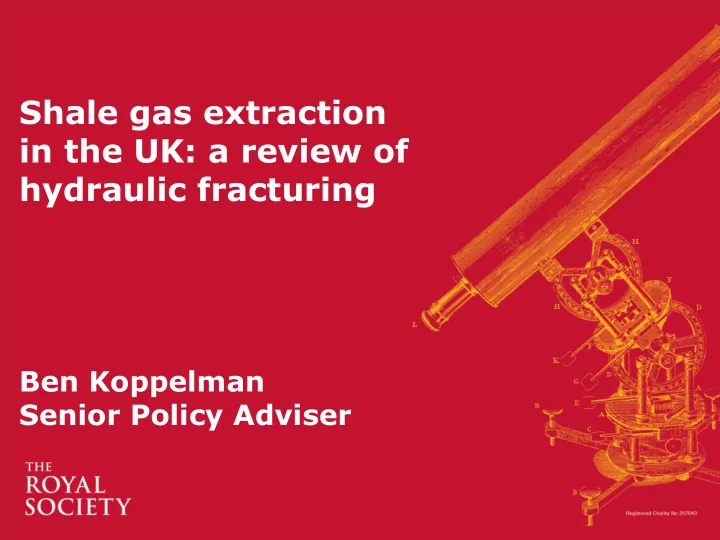

Shale gas extraction in the UK: a review of hydraulic fracturing Ben Koppelman Senior Policy Adviser
Terms of reference What are the major risks associated with hydraulic fracturing? Can these risks be effectively managed in the UK? If so, how?
Headline messages Yes ....as long as operational best practices are implemented and enforced through regulation. But ...attention to how risks scale up 10 Recommendations Cross-cutting issues • Monitoring • Data sharing
Impact “I have also had the benefit of the comprehensive and authoritative review of the risks of fracking by the Royal Society... ... the Government accepts all the recommendations of the academies’ report. Work is already in hand to implement these recommendations”
1 Ensuring well integrity Improve UK’s well examination scheme • Clarify guidelines for independence • Review well designs from health, safety and environmental perspective • Onsite inspections as appropriate Submit results of well tests and reports of well examinations to DECC
Government response Option for in-house well examiner still open New industry guidelines: well examiner or separate contractor to assess well integrity from environmental perspective Operators to ask well examiners to make onsite visits at discretion of examiner (public confidence) Well integrity tests to be made available to DECC
2 Detecting groundwater contamination National baseline surveys Site-specific monitoring before, during and after operations Monitoring arrangements for abandoned wells need to be developed
Government response EA and BGS: national baseline Operators: site specific Abandoned wells: Cuadrilla trying specific measures Monitoring data: Upload onto operators website
3 Mitigating induced seismicity National surveys (BGS or others) Site-specific surveys (operators) Traffic light monitoring systems • Monitor before, during and after • Feed back data to allow mitigation DECC should consider how induced seismicity is to be regulated Operators should share data with DECC and BGS to establish a national database
Government response BGS to carry out regional, not national surveys Operators to carry out seismic risk assessment as part of a new Fracturing Plan • Draw on BGS’ regional data • Site specific data before, during and after • Details of mitigation (traffic light system) • DECC to regulate seismicity by overseeing Frac Plan
4 Detecting potential gas leakages Site-specific monitoring before, during and after operations Submit data to the appropriate regulator, to inform wider assessments (e.g. carbon footprint of shale gas extraction)
Government response EA reviewing existing regulation to consider existing controls for methane leakage Industry guidelines to draw on EA review Data onto websites and shared with EA and DECC
5 Integrated water management Minimise water use and reduce abstracting pressures Recycle and reuse wastewater where possible Construction, regulation and siting of any future onshore disposal wells need further investigation
Government response Industry guidelines to minimise water use Onshore disposal wells not considered good practice in UK
6 Managing environmental risks Environmental Risk Assessment (ERA) should be mandatory for all shale gas operations, involving participation of local communities at the earliest possible opportunity ERA should assess risks across entire lifecycle, including disposal, well abandonment and seismic risks
Government response Comprehensive ERA to become best practice: Caudrilla carrying out a ERA Cranfield University helping to develop ERA guidelines for shale gas
7 Best practice for risk management Goal-based risk assessments according to ALARP principle (As Low as Reasonably Practicable) UK regulators should work together to develop guidelines specific to shale gas Industry mechanisms to collect and share data to inform risk assessment
Government response Industry to develop guidelines Some confusion: • Does onshore shale gas need a safety case? Data sharing: DECC will discuss with industry
8 & 9 Regulation Ensure regulatory co-ordination: a single body should take the lead Ensure regulatory capacity
Government response DECC’s new Office of Unconventional Oil and Gas Internal reviews of regulatory system for exploration and possible production phases
10 Research priorities Public acceptability Wider policy context: energy, economy, climate change
Government response DECC study on methane leakage
To find out more, visit royalsociety.org Ben Koppelman Senior Policy Adviser Ben.koppelman@royalsociety.org
Recommend
More recommend